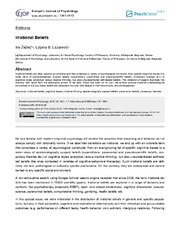| dc.creator | Žeželj, Iris | |
| dc.creator | Lazarević, Ljiljana | |
| dc.date.accessioned | 2021-10-12T13:01:59Z | |
| dc.date.available | 2021-10-12T13:01:59Z | |
| dc.date.issued | 2019 | |
| dc.identifier.issn | 1841-0413 | |
| dc.identifier.uri | http://reff.f.bg.ac.rs/handle/123456789/2847 | |
| dc.description.abstract | Irrational beliefs are often used as an umbrella term that comprises a variety of psychological constructs: from specific cognitive biases to a wider class of epistemologically suspect beliefs (superstitions, paranormal and pseudoscientific beliefs, conspiracy theories etc.) or cognitive styles (analytical versus intuitive thinking), but also unsubstantiated self-related beliefs. This collection of papers illustrates this diversity well. Apart from the descriptive portion of the data, which has merit on its own, the authors provide important methodological innovations in the way these beliefs are measured, but also look deeper in their functionality and consequences. | en |
| dc.publisher | Psychopen, Trier | |
| dc.rights | openAccess | |
| dc.rights.uri | https://creativecommons.org/licenses/by/4.0/ | |
| dc.source | Europes Journal of Psychology | |
| dc.subject | paranormal beliefs | en |
| dc.subject | irrational beliefs | en |
| dc.subject | intuitive thinking | en |
| dc.subject | epistemologically suspect beliefs | en |
| dc.subject | conspiracy theories | en |
| dc.subject | cognitive biases | en |
| dc.title | Irrational Beliefs | en |
| dc.type | contributionToPeriodical | |
| dc.rights.license | BY | |
| dc.citation.epage | 7 | |
| dc.citation.issue | 1 | |
| dc.citation.other | 15(1): 1-7 | |
| dc.citation.spage | 1 | |
| dc.citation.volume | 15 | |
| dc.identifier.doi | 10.5964/ejop.v15i1.1903 | |
| dc.identifier.fulltext | http://reff.f.bg.ac.rs/bitstream/id/1519/2844.pdf | |
| dc.identifier.pmid | 30915169 | |
| dc.identifier.scopus | 2-s2.0-85063031700 | |
| dc.identifier.wos | 000460019900001 | |
| dc.type.version | publishedVersion | |

